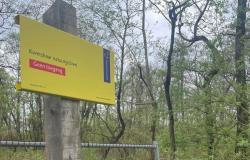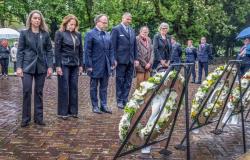Science
Mayor Jan Tuin stands to the right of the disputed house. Photo collection Image Bank Groningen
The battle for Kamplaan 8
Mayor Jan Tuin stands to the right of the disputed house. Photo collection Image Bank Groningen
The professional insights of emeritus professor of history Maarten Duijvendak clash sharply with those of the Jewish family he was researching. And then? To apologize? ‘I can only defend my reputation by continuing to do good work.’
April 24 at 10:52 am.
Last modified on April 24, 2024
at 4:14 p.m.
April 24 at 10:52 AM.
Last modified on April 24, 2024
at 4:14 PM.
There is hypothermia and there is hypothermia.
“No, of course I don’t like it,” says Maarten Duijvendak about the long-running conflict between himself and the Jewish Van Blankenstein family, which he was researching. “I have emotions too.”
But the only way to deal with something like this, says the emeritus professor of history, is to remain businesslike. Professional. ‘Remain rational and have your facts in order.’
And so he tries – where possible – to explain why he has come to certain conclusions. Historical sources simply have their limitations, because not everything has been preserved. Then you have to put together what you know and deduce the most likely scenario.
Moreover, he realizes how sensitive the issue is for the victims. ‘Maybe we didn’t pay enough attention to this, when the family story, which is very important, did not match the dry factual account.’
Five rules
The disagreement between Duijvendak and the descendants of the Jewish Van Blankenstein family, the original owners of the house Kamplaan 8 in the villa neighborhood in Groningen South, has been going on for more than two years. He and his fellow researchers wrote five lines of text about it Empty spotsthe study into the way in which the municipality of Groningen dealt with the real estate of returning Jewish residents after the war.
The building remained rented by the NBI until the summer of 1951 [dat de vermogens beheerde van tijdens de oorlog verdwenen personen, zoals gedeporteerde Joden, maar ook van collaborateurs en Duitsers die in Nederland woonden, red.] who ended management in June of that year. A year later, the house was rented to Jan Tuin, the newly appointed mayor of the city. The municipality then bought the building to use as a new official residence.
“We mentioned it as an example of the difficult situations that could arise when justice was restored after the war,” he says. The government had to untangle a legal tangle of assets that had been sold during the war and had conflicting interests.
Own vision
But that matter-of-fact paragraph rubbed Hubert van Blankenstein, whose mother was the only survivor of her family, the wrong way. Because, he emailed the municipality emotionally, ‘although I appreciate the amount of work that has been done, I certainly cannot agree with the representation of the history of the building in question.’
The report paid no attention to the story behind the sale, Van Blankenstein found. “What is unusual about this story is that even after the war, everything was done to ensure that the house NEVER, NEVER, was returned to its rightful owners,” he wrote. That had to come to light: how the mayor’s ‘games and chicanes’ had ensured that his parents had no choice but to sell the building.
Every effort has been made to ensure that the house NEVER returns to the owners
~ Hubert van Blankenstein
And so he added his own vision and asked the municipality to forward it to the researchers. They could then adjust the report.
Not very unusual, Duijvendak knows. “It really has to do with the loss of expertise,” he thinks. ‘Science is considered an opinion, while not everything is a right or wrong.’
Historians who write about sensitive issues, such as the Second World War, notice this even more than others. ‘It evokes strong emotions when research results do not match what relatives have constructed as a family story over the years. And what is “being right”?’
But although Duijvendak delved again into the situation around Kamplaan 8 at the request of the municipality and wrote an additional report, he found no evidence for Van Blankenstein’s story.
Criticism
What followed was a claim for damages of 328,000 euros from the municipality of Groningen – based on the fact that the house had yielded less money when sold because it had been rented out – which has now been paid out. The mayor also apologized for the way the family was treated after the war. However, the municipality did not distance itself from the report.
Van Blankenstein himself also wrote a book about his parental home, in which he sharply criticized Duijvendak’s insights. This in turn led to reports in the national media, including: News hour and Pointerand heated email exchanges between Van Blankenstein’s publisher, Van Blankenstein himself and Duijvendak.
The provisional final piece was an ‘open letter’ from Van Blankenstein under the title J’accusein which he accuses the historian of a ‘false narrative’ and “willful ignorance‘. The title is a deliberate reference to Emile Zolá’s open letter from 1898, which defended the wrongfully convicted Jewish officer Dreyfuss. In other words: Van Blankenstein indirectly accuses Duijvendak of anti-Semitism.
Hard and soft sources
It is difficult to navigate for Duijvendak, a renowned socio-economic historian. Because he did what he had to do: he delved into the sources and wrote a report about what they told him. He is well aware that this history is an open wound for the Van Blankenstein family. And it is also clear that it clashes with the family story of the Van Blankenstein family.
Unless he comes up with facts, I can’t change my conclusions
~ Maarten Duijvendak
But should he ‘take a knee’, as Van Blankenstein’s publisher suggested? Should he adopt Van Blankenstein’s story, while his version does not correspond to the facts? ‘Unless he presents facts, a document I have not yet seen that shows otherwise, I cannot change my conclusions. But at the moment they are not there yet.’
The problem here, thinks Duijvendak, is the clash between the business historian and the amateur – passionate, but untrained. “For a historian, there are hard sources and soft sources,” he explains. Hard sources are the decisions of the municipal council or the civil registry certificates. You can base legal facts on that. Soft sources are letters or personal documents, such as diaries. ‘Very important, because you can derive experiences and motives from it.’ But these are often colored and not necessarily correct.
Also important is placing your facts in context. How likely is a given scenario? Are there facts that make certain insights more or less likely?
Rental agreement
Based on his professional knowledge, Duijvendak sees it this way: the claim on Kamplaan 8 was lifted as soon as the Germans cleared the field in Groningen in April 1945. But when the family returned, they found the house in a rented state. The rent is recorded in their financial administration.
But that had consequences. “If you receive rent, there is a rental agreement and therefore rental protection,” says Duijvendak.
And so the municipality could not simply evict the tenant. Only when he left in 1951 was there an opportunity for the family to return. However, he did not receive permission from the municipality. However, the new mayor Jan Tuin moved in. Six months later, the property was sold in a rented state to the municipality for the asking price.
“You could say that the municipality has taken a morally strange step there,” Duijvendak admits. But, he also says: that is with the look of today. The housing shortage just after the war was unimaginable. “You had people who lived in old trams on the Friesestraatweg,” he says. “It was that bad.”
The rules regarding housing allocations were strict. ‘Government officials came before municipal officials and they in turn took precedence over mere mortals.’ Whether someone was a war victim or not made no difference at that moment.
Seizure
But Van Blankenstein sees this view as an insult to his late father. He says that the municipality never lifted its claim on the house after the war, because it was an ideal home to house high-ranking municipal officials. His father had no choice but to sell the house in 1951, suffering an “enormous financial loss.”
I found administrative traces of all kinds of other buildings, but not of this one
~ Maarten Duijvendak
Duijvendak should have known that, Van Blankenstein argued, because the Memories of his father, written down in the 1980s, not in the Municipal Archives? And didn’t it say that his father had never been allowed to move into the beautiful, suitable villa with his rapidly growing family? “No particular motivation was given for it,” his father wrote. ‘The municipality had seized this villa and I have always had a strong suspicion that people did not consider our family suitable there.’
That word ‘batter’ is crucial. A ‘fact’, says Van Blankenstein. Questioning the words of his father, a victim of war, is unthinkable. He is convinced that the mayor cheated to be able to live in the house himself.
Conspiracy theory
‘But it could also be intended as a figure of speech,’ says Duijvendak. ‘He may have experienced the fact that he was not allowed to live there as a seizure from the municipality.’ Moreover, he says, a municipal seizure would have left administrative traces. ‘And I don’t think so. Of all kinds of other buildings, but not of this one.’
Moreover, it was virtually impossible for the mayor to circumvent the housing law, says Duijvendak. The communist CPN was in the opposition and would have immediately seized the opportunity to undermine the mayor. “The political space was not there,” says Duijvendak.
What Van Blankenstein writes is essentially a conspiracy theory, says Duijvendak. ‘Anyone who claims that the earth is flat must come up with good arguments. Anyone who claims that a claim by the German Wehrmacht continued until two decades after the war and in passing accuses a mayor and a municipal secretary must provide good evidence for such an unfounded claim,” he also emailed the publisher.
But in the meantime there is still that open letter with all its accusations. But Van Blankenstein’s words are too polite to file a complaint for defamation, again Duijvendak. ‘Moreover, the right to freedom of expression is a great asset. I can only defend my reputation by continuing to do good work.’
Response from Hubert van Blankenstein
It’s unfortunate. Professor Duijvendak has not been able to substantively refute any of my assumptions that were presented with hard evidence in my book. Not even now. My statement is unequivocally supported by the PhD research of Dr. Gert Jan van Setten, War profitspage 364.
In his clumsy and failed attempt at refutation, Professor Duijvendak continually contradicts himself. It is a technical-legal discussion that will not interest many, but the untruths that Professor Duijvendak presents ensure that my father should in fact be posthumously blamed for a bad housing deal with the municipality.
While this municipality also tried to ‘smoke out’ my father in the business field (paint factory). And that was also successful. So first we are treated unfairly by the municipality and then we are unfairly kicked by Professor Duijvendak. That hurts the family. And that is putting it mildly.
Professor Duijvendak is unable and too vain to step over his own shadow and admit his mistake. And I owe it to my father and the rest of the family who survived the war to continue to fight this injustice.
This battle is very difficult because the RUG has earned a lot of money from Professor Duijvendak’s research. The ranks are closing. That is unpalatable, especially in a city with the highest percentage of deported and murdered Jews. Approximately 90 percent of Groningen Jews did not survive, while the national percentage is approximately 75 percent.
English







